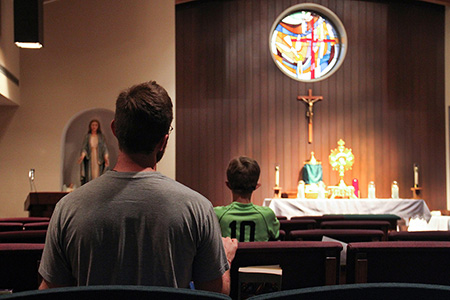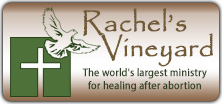This email address is being protected from spambots. You need JavaScript enabled to view it.l
Diocese of Lake Charles
Praying together as husband and wife can be hard. Some might even say it is awkward. Even married couples who are comfortable sharing their joys and sorrows with God together will admit it can be a challenge unless you are both willing to make it a priority.
David Dawson, director of the Archdiocese of New Orleans Family Life Apostolate, said he and his wife, Kate, assumed being on the same page spiritually would just happen naturally because they wanted it. But it wasn’t that simple.
“Everyone says marriage is the path to holiness,” said David, “but my wife Kate and I did not feel that way in the beginning.”
This struggle for the Dawsons early on in their 12-year marriage was the catalyst for them to bring Domestic Church to the Diocese of Lake Charles in 2011, at which time they were residents.
Founded in Poland in 1973 with the support and guidance of Pope Saint John Paul II, Domestic Church is recognized as an international lay movement for sacramentally married couples to achieve holiness together. Lake Charles is the first English-speaking branch of Domestic Church and has grown to 15 dioceses across the United States including all seven dioceses in Louisiana over the past eight years.
When they first heard about Domestic Church, David and Kate (now parents to seven children) had only been married about two years, had a 1-year-old, and were expecting their second child.
David admits, “Our marriage felt anything but holy. Our expectations of each other and of God and of the Church left us feeling disappointed.”
God would soon make it clear to David through a business trip to Poland that there was an answer to the obstacles he and Kate were facing. “It was there that I met Thomas and Agnes Talaga, who, by far, were the holiest married couple I had ever come across,” recalls David.
“What struck me about them was they were not holy in a way that they were never arguing, but there was a deep sense of security and love they had for one another, a deep peace and joy and generosity,” David noted. “It was obvious they were very much connected to each other, connected in prayer.”
On a second trip to Poland, Thomas and Agnes introduced David to the international coordinators of Domestic Church who agreed to travel with a Polish priest to Lake Charles to begin translating formation materials into English, free of charge.
Learning that Saint John Paul II supported the movement was a big plus for David. “Having a great devotion to him and love of his teachings and his understanding of marriage and family, I was very attracted to that,” he said.
It wouldn’t take long before he came to understand that Domestic Church would give he and Kate just enough structure and accountability to be able to take advantage of what was already available — basic spiritual practices they were already trying to do, what the Catholic Church offers through the Sacraments, the Scriptures, parish community and through parish priests.
“The more I heard, the more I came to realize this is why God wanted me to go to Poland, to learn about this Domestic Church movement and bring it back to the United States,” David said.
Stepping out in faith alone is one thing, but praying together as a couple and discerning together has brought about a deeper intimacy between David and Kate, a deeper appreciation and gratitude for one another.
“It is helping us to take real concrete steps and make progress in our own unity and be on the same page with prayer and grow together spiritually,” said David.
The reassurance he and Kate receive through couple prayer and dialogue has allowed them to move forward trusting that God is always with them.
“When God is speaking to both of us and we are both receiving the same message, it’s amazing how the confidence and the security of knowing that God is doing real things … there’s just no comparison.”

Blaine and Denise Wyninger, parishioners of Our Lady of Prompt Succor Catholic Church in Sulphur, agree that if you possess a desire to be able to communicate more effectively with your spouse and with your children, Domestic Church has wonderful tools to help couples achieve that goal with success.
“Domestic Church offers a road map through a set of commitments to help couples connect spiritually and communicate together,” said Denise.
Praying together as a couple in a more intimate way was not always the case for the Wyningers, now married 16 years and serving their first term as the national couple for Domestic Church.
“To ask Blaine to want to pray together use to feel awkward,” Denise said, but “it’s normal now to be able to have that conversation with him.”
Couples are introduced to Domestic Church through an evangelization retreat. For Blaine and Denise, that was in December of 2012.
Blaine recalls, “We had heard something about the evangelization retreat meant for married couples to experience together. The idea for me not going through a spiritual experience by myself, but instead going through something with my spouse was attractive to us.”
During the evangelization retreat, couples are given the opportunity to experience Christ in a new way over several days with a focus on what God is doing in their marriage as they work toward helping each other toward Heaven.
It is over these few days that couples learn about the “seven promises” or rather seven basic principles of spiritual growth in the Catholic tradition specific to the vocation of marriage and family. They are: daily individual prayer, daily study of scripture, daily couple prayer, daily family prayer, monthly couple dialogue, Rule of Life, and annual family retreat.
Praying together in a more intimate way with Denise through couple dialogue and couple prayer was a new experience, said Blaine.
“We had never prayed together as spouses where I got to hear my wife’s words to God, and she got to hear my words to God, my deepest fears, my deepest concerns,” Blaine said.
While the seven promises provide structure to the Domestic Church movement, Blaine said it is not so structured that it tells you exactly what your prayer life is meant to look like.
“The structure allows space and time for the Holy Spirit to speak to your individual family’s needs,” he said. “For example, Domestic Church tells me I need to pray with my wife on a daily basis. It does not tell me what my prayer should be, only that I need to do it.
“All these commitments allow us to see God for who he is, the Catholic Church for who she is, our family for who we are. The seven promises are just basic fundamental principles of what we all should be doing, but until we do them, we don’t see that,” Blaine continued.
The commitments also bring balance to the Wyninger household with their seven children, ranging in ages 14 years to 6 months.
Blaine notes, “There is an order that allows us to withstand whatever chaos life brings us because of the balance we have as a married couple, with our children, in the spiritual sense; all that comes from our commitments.”
Denise can affirm, “When we pray about things together, it’s crazy to watch it really happen. It’s amazing the power of prayer together. Communication is huge; it allows us to know each other better because we are communicating often.”
For couples who are interested in Domestic Church but are convinced that their busy lives just don’t have room for daily commitments, David has a message for them: They are not alone.
“Many people want to pray with their spouse and family, they want to take the time to talk with each other about how they are doing as a couple, as a family, but they don’t because they don’t know how to balance everything,” he said.
“The good thing about Domestic Church is that it will help spouses prioritize and make time for what is important,” assures David.
Domestic Church has a support system providing a monthly evaluation process with group circles to help couples see how they are doing, in what areas they are growing spiritually, and what areas need improvement.
The circle groups, usually between 4-7 couples, meet in the homes of its members to share the joys and sorrows of their journey, to pray together, discuss progress in their spiritual growth, and go over formation materials for the month.
“As we discuss these things with other couples in the circle, we can listen for how the Holy Spirit is working in all of us,” Blaine said.
Each circle is also assigned a priest who attends the monthly meetings. Their role isn’t to lead as much as it is one of fatherly guidance. They can soak in what the real-life struggles and successes are for families and then apply that to their own ministry.
Blaine emphasized the importance of the priest and couples gathering each month.
“The vocations are fed through the circle meetings. When you are face to face with married couples who see that marriage is for holiness, and you are coupled with a priest who sees that the vocation of priesthood is for holiness, it is incredibly fruitful,” said Blaine. “It’s a really cool dynamic that I would have never pictured until I got involved in Domestic Church.”
The Very Reverend Ruben Buller, V.G., who is serving his first year of a four-year term as national chaplain for Domestic Church, said it is inspiring to see couples work together despite all the challenges they face in their own families, with each other, in the workplace, etc.
“These are real people who are really trying to be holy and do what is right,” said Father Buller. “In that sense, it’s good for me because I hear, listening to them in the busy-ness of their own lives, that they are doing God’s will. That helps me as well as I deal with couples on a different level.”
Be it the consecrated life through holy orders or through married life, Father Buller echoed Blaine’s remarks saying the beauty of Domestic Church is the coming together and feeding one another’s vocations through the circle meetings.
“We are not walking alone. Struggles that are brought to the light in the monthly meetings are blessed by God and are exposed to the grace of God,” he said.
“As we talk about our joys and sorrows, our highs and lows as it were, when we begin to walk together as a circle, there is a mutual love and support that everyone gives to each other in their own unique way as married couples, as a priest. It’s a beautiful thing to walk together.”
In his role as a circle priest, which he said is a “joy and highlight of his month,” Father Buller can offer spiritual direction for the couples. “When we talk about the commitments, there might be a question that someone has or maybe several people may have. In that regard, I try to offer spiritual counsel,” he said.
Father Buller encourages married couples who are serious about helping each other get to Heaven and grow in holiness to attend an evangelization retreat. “Domestic Church is good for anyone who is in a sacramental marriage who is willing to make these commitments, which most people strive to do anyway,” he said.
















